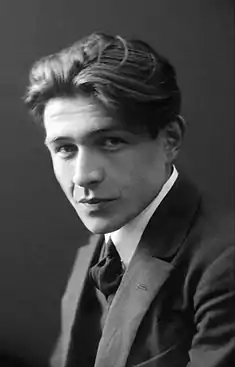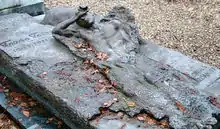Gaito Gazdanov
Gaito Gazdanov (Russian: Гайто́ (Гео́ргий) Ива́нович Газда́нов, Gaito [Georgii] Ivanovich Gazdanov; Ossetian: Гæздæнты Бæппийы фырт Гайто, Gæzdænty Bæppijy fyrt Gajto; 6 December [O.S. 23 November] 1903–5 December 1971) was a Russian émigré writer, living in Paris. He was of Ossetian descent, his father was from Ossetia, a North Caucasus's country within the Russian Empire. His first stories were published in France in 1926 in Russian language. He was a member of the French Resistance when fascists occupied France. An Evening with Claire, a novel of 1929, became his more well-known work, mentioned by writers Maxim Gorki, Vladislav Khodasevich. He joined Radio Free Europe/Radio Liberty as an editor in 1953. Living abroad, Gaito Gazdanov learned perfect French, but was writing stories in Russian language.[1]
Gaito Gazdanov | |
|---|---|
 | |
| Native name | Гайто (Гео́ргий) Иванович Газданов Гæздæнты Бæппийы фырт Гайто |
| Born | Gaito [Georgii] Ivanovich Gazdanov Gæzdænty Bæppijy fyrt Gajto 6 December [O.S. 23 November] 1903 Saint Petersburg, Russian Empire |
| Died | 6 December 1971 (aged 68) Munich, BRD |
| Occupation | short story writer, novelist, Radio Free Europe/Radio Liberty editor |
| Citizenship | Russian Empire (1899–1917) France (1920–1971) |
| Notable works | An Evening with Claire The Specter of Alexander Wolf |
Biography
Gazdanov was born in 1903 in Saint Petersburg but was brought up in Siberia and Ukraine, where his father worked as a forester. He took part in the Russian Civil War on the side of Wrangel's White Army. In 1920 he left Russia and settled in Paris, where he was employed in the Renault factories. The early short stories and novels dealt with this Russian experience. But by the mid 1930s, the years in Paris turned Gazdanov's themes toward life, Russian or French, in France. Later, he earned his living as a taxicab driver. Gazdanov can be regarded as a White émigré. He died in Munich in 1971.
Gazdanov's first novel — An Evening with Claire (1930) — won accolades from Maxim Gorky and Vladislav Khodasevich, who noted his indebtedness to Marcel Proust. In Black Swans, a 1930 short story, the protagonist commits suicide because he has no opportunity of moving to Australia, which he imagines to be an idealised paradise of graceful black swans. On the strength of his first short stories, Gazdanov was described by critics as one of the most gifted writers to begin his career in emigration.
Gazdanov's mature work was produced after World War II. He tried to write in a new genre metaphysical thrillers. His mastery of criminal plots and understanding of psychological detail are in full evidence in his two most popular novels, The Spectre of Alexander Wolf and The Return of the Buddha, whose English translations appeared in 1950 and 1951. The writer "excels in creating characters and plots in which cynicism and despair remain in precarious yet convincing balance with a courageous acceptance of life and even a certain joie de vivre."[2]

In 1953, Gazdanov joined Radio Liberty, where he hosted a program about Russian literature (under the name of Georgi Cherkasov) until his death in 1971 of lung cancer.
Gazdanov's works were never published in the Soviet Union. After several decades of oblivion, starting from the 1990s more than fifty editions of his works, including a three-volume collection (1998) followed by a 5-volume collection (2009, ed. by T.N. Krasavchenko) were finally published in post-Soviet Russia. The Ossetian artistic community, led by Valery Gergiev, had a new tombstone placed at his grave in Sainte-Geneviève-des-Bois. The annual Gazdanov Readings are held to discuss his literary heritage.
Novels
- Vecher u Kler (An Evening with Claire) (1929)
- Istoriya odnogo puteshestviya (The history of a journey) (1938)
- Polyot (The flight) (1939; first complete ed. 1992)
- Nochnaya doroga (Night road) (1939–40); book pub. as Nochnye dorogi (Night roads) (1952)
- Prizrak Aleksandra Vol'fa (The Spectre of Alexander Wolf) (1947–48)
- Vozvrashchenie Buddy (Buddha's Return) (1949–50)
- Piligrimy (Pilgrims) (1953–54)
- Probuzhdenie (The awakening) (1965–66)
- Evelina i eyo druzya (Evelina and her friends) (1968–71)
Works in English Translation
- The Specter of Alexander Wolf (Prizrak Aleksandra Vol'fa), translated by Nicholas Wreden (New York: Dutton, 1950)
- Buddha's Return (Vozvrashchenie buddy), translated by Nicholas Wreden (New York: Dutton, 1951)
- An Evening with Claire (Vecher u Kler), translated by Jodi Daynard (Ann Arbor: Ardis, 1988)
- Night Roads: A Novel (Nochnye dorogi), translated by Justin Doherty (Evanston: Northwestern, 2009)
- The Spectre of Alexander Wolf (Prizrak Aleksandra Vol'fa), translated by Bryan Karetnyk (London: Pushkin, 2013)
- The Buddha's Return (Vozvrashchenie buddy), translated by Bryan Karetnyk (London: Pushkin, 2014)
- The Flight (Polyot), translated by Bryan Karetnyk (London: Pushkin, 2016)
- The Beggar and Other Stories, translated and introduced by Bryan Karetnyk (London: Pushkin, 2018)
References
- László Dienes. "Gaito Gazdanov - Harvard Magazine". Harvard Magazine. Archived from the original on 13 October 2016. Retrieved 11 November 2019.
- The Cambridge History of Russian Literature (ed. by Charles Moser). Cambridge University Press, 1992. ISBN 0-521-42567-0. Page 518.
Further reading
- Orlova, Olga (2003). Gazdanov. Moscow: Molodaya Gvardiya. ISBN 5-235-02644-6.
- Dienes, László (1982). Russian literature in exile: The life and work of Gajto Gazdanov. München.